THE
PETTENGILL PERCUSSION ARMY REVOLVER
AND IT'S SIBLING
THE
RODGERS AND SPENCER PERCUSSION ARMY REVOLVER
by
David Radcliff |
| A TWO PART
RAMBLING OF TWO REVOLVERS WITH THE SAME FRONT END! |

TOP: THE RODGERS AND
SPENCER .44 CALIBER SINGLE ACTION PERCUSSION ARMY
BOTTOM: THE PETTENGILL
.44 CALIBER DOUBLE ACTION PERCUSSION ARMY REVOLVER (See
Part 1) |
__________________________________________________________________________________________
PART
2
THE
ROGERS & SPENCER
SINGLE
ACTION PERCUSSION ARMY REVOLVER |
In 1864, after producing the ill fated
Pettengill Army and Navy size revolvers, Rogers and Spencer started to
produce a much improved firearm bearing their name. They basically retained
the forward part of the frame, barrel and loading lever assemblies of the
Pettengill Percussion Army Revolver probably utilizing the same machinery
to manufacture both. On November 29, 1864, Rogers, Spencer & Company
received a War Department contract for 5,000 of their revolvers at a cost
of $12.00 each. The contract called for 500 to be delivered in January
of 1865 and 500 more per each month thereafter until all of the arms were
delivered. They met the contract terms delivering the last 500 in September
of 1865 approximately 4 months after the cessation of hostilities. The
particular weapon pictured here, serial number 2879, was probably delivered
in June of 1865. Despite the Rodgers & Spencer being among the
best of the percussion military revolvers ever produced none of them were
issued for field service during or after the war. All 5,000 of them were
kept in storage in New York until 1901. At that time the entire lot of
them were sold at auction at a cost to the bidder of around $ .50 each.
Due to this, today we find many of these revolvers in new or nearly new
condition. However, some are also found that show hard usage indicating
that some people found them useful after all. The total number of Rogers
and Spencer arms produced, based on existing serial numbers, was approximately
5,800 indicating that some were likely sold on the commercial market.

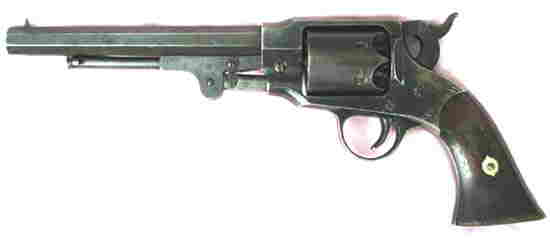
RIGHT &
LEFT SIDE VIEWS OF THE ROGERS AND SPENCER .44 CALIBER SINGLE ACTION
PERCUSSION ARMY REVOLVER |
__________________________________________________________________________________________
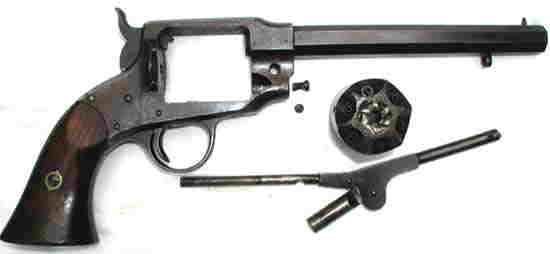
LEFT SIDE VIEW OF
THE SPENCER & ROGERS ARMY REVOLVER WITH THE COMBINATION LOADING LEVER
/ CYLINDER ARBOR MECHANISM, LEFT AND RIGHT SET SCREWS AND CYLINDER
REMOVED |
This single action, six-shot arm is .44
caliber and weighs 3 pounds. Measured diagonally from the tip of the butt
to the muzzle face it is 14-1/4" overall. The 7-1/2" barrel is rifled with
5 grooves. The barrel is marked on the top strap "ROGERS & SPENCER
/ UTICA N.Y" in two lines. A government inspectors mark of a "B" is stamped
on both the left and right barrel flats near the frame housing. Centered
on the bottom of the barrel is the serial number, "2879". An "0" is stamped
to the rear of the loading lever catch located 1-1/2" on center from the
muzzle. The inspector's "B" stampings are also on both the left and right
sides of the upper forward frame, on the left frame below the hammer, and
at the bottom of the frame to the rear of the trigger guard screw. It is
also stamped on the left side of the hammer and the left side of the combination
loading lever and cylinder arbor near the frame as well as towards the
rear of the cylinder between two of the beveled, semi-circular nipple wells,
and in front of the mis-stamped serial number on the cylinder. That stamping
consists of an upside down "3" followed by "879". The correct serial number
stamping of "2879" is also on the left frame under the cylinder opening,
on the bottom of the grip strap, on the top of the combination loading
lever and cylinder arbor assembly (twice) and inside both grips. On the
bottom of the frame in front of the trigger guard screw is the stamping
of a small shield. The cartouche of the inspector's initials is stamped
in the left grip of the two-piece, oil-finished walnut grips. Although
quite faint they are "RPB" for Robert P. Barry, Captain U.S.A., 1860-1865.
"ROGERS & SPENCER
/ UTICA N.Y" STAMPING -TOP OF FRAME
(ALSO NOTE SIGHTING
GROOVE) |
"B"
INSPECTOR'S MARKINGS LEFT AND RIGHT SIDE BARREL FLATS & FRAME, LEFT
SIDE
LOADING
LEVER, HAMMER AND TRIGGER GUARD PLUS SHIELD STAMPING |
__________________________________________________________________________________________
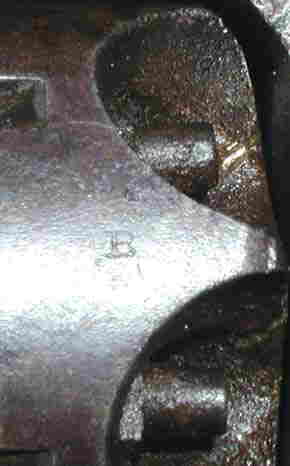
"B" ON CYLINDER BETWEEN
NIPPLE WELLS |
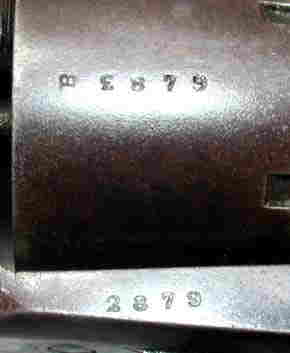
SERIAL NUMBER "2879"
STAMPING CYLINDER* AND LEFT FRAME (* MIS-STAMPED) |

NUMBER "0" AND SERIAL
NUMBER "2879"ON BOTTOM BARREL FLAT |
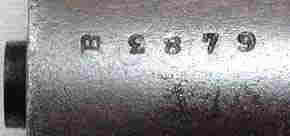
CLOSE UP OF MIS-STAMPED
SERIAL NUMBER (UPSIDE DOWN "3" PLUS "879") |
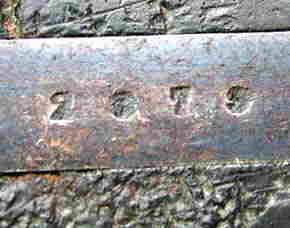
ERIAL NUMBER "2879"
ON BUTT STRAP |

SERIAL NUMBER "2879"
ON RAM ROD / CYLINDER ARBOR PIN |
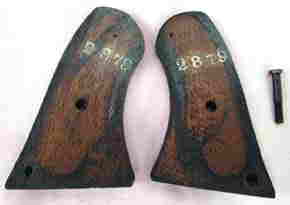
SERIAL NUMBER "2879"INSIDE
GRIPS |
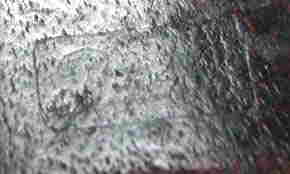
LEFT GRIP CARTOUCHE
(FAINT)
("RPB" for Robert
P. Barry, Captain U.S.A., 1860-1865) |
__________________________________________________________________________________________
There is a high German silver cone
front sight set 3/8", on center, from the muzzle face. The rear sight is
formed by a pinched "V" groove formed into the top strap. The blued, solid
frame is marked as described above. At the front of the cylinder the frame
drops vertically enclosing the barrel threads. There is a cone shaped loading
groove at the lower right of the frame. A somewhat flat recoil shield behind
the cylinder is cast integral to the frame. A semi-circular capping groove
is present in the right side recoil shield. The hammer was originally case-hardened.
The blued six chamber 2 inch long cylinder has rectangular shaped stop
slots. The nipples are recessed in beveled, semi-circular wells. The one
piece grip straps and trigger guard are blue finished as is the trigger.
The two screws at the rear of the frame serve to properly position the
grip straps. The case-hardened loading lever has a plunger type latch that
is held by a catch mortised into the bottom of the barrel 1-1/2" from the
muzzle. The loading lever/cylinder arbor assembly is held in place by set
screws which enter the frame from each side just forward of the cylinder.
These set screws must be removed to free the cylinder. The black walnut
two piece grips flare out quite noticeably at the butt giving this arm
a unique appearance.
If I have one criticism of this arm,
it is the set screws. It is always easier to load the cylinder when it
is out of the gun. The user would need a screw driver to remove these set
screws if he wished to take the cylinder out each time he loaded the weapon.
A prospect fraught with problems when in the field.
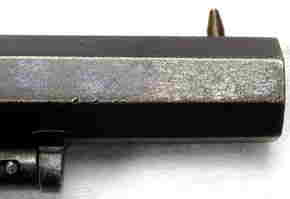
FRONT CONE SIGHT |
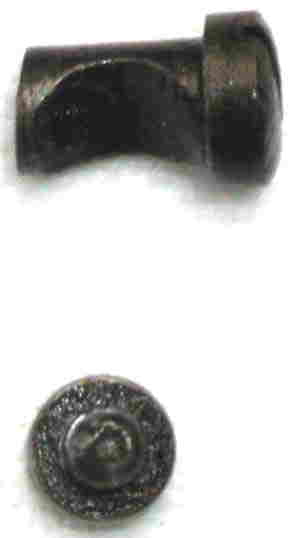
SET SCREWS FOR RELEASING
LOADING LEVER / CYLINDER ARBOR |
 |
 |
| LEFT & RIGHT SIDE
VIEWS - BARREL, LOADING LEVER & FRONT OF FRAME |
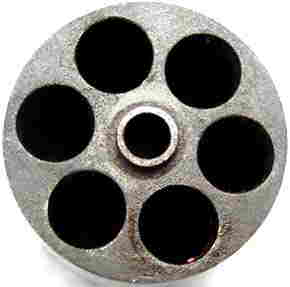
FRONT CYLINDER VIEW |
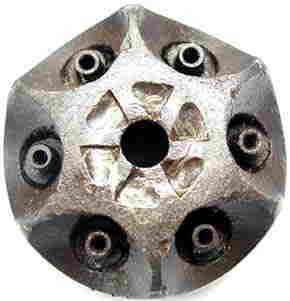
REAR CYLINDER VIEW |


TOP & BOTTOM OVERALL
VIEWS |
__________________________________________________________________________________________
Reference material for this posting
came from "U.S. Military Small Arms 1816-1865" by Robert M. Reilly, "Civil
War Small Arms", an American Rifleman Reprint - Articles "Civil War Revolvers
Part 1 & 2 of 2" by C. Meade Patterson & Cuddy De Marco, Jr. and
Norm Flayderman's "Flayderman's Guide To Antique American Firearms... And
Their Values".
The photographs are all originals of
mine as are any assumptions or errors in this posting. The ace webmaster
is Reed Radcliffe, my son, who puts this all together for your viewing.
GOD BLESS AMERICA!!
Dave Radcliffe
==============================================
Permission to reprint this article
given by
Antique and Collectable Firearms
and Militaria Headquarters
http://OldGuns.net
sponsors of http://ArmsCollectors.com
where many similar stories are located, as well as the Springfield Research
Service site to look up documented history of U.S. miltiary small arms
based on serial numbers. |
| Getting a Grip by Cliff Hanger
At so many matches I see shooters at the firing line wiping
their hands off before they start. It's not those that wipe their hands
once but those that keep doing it over and over before saying they're ready.
Most of this is most likely nerves. And with this nervousness comes sweaty
hands.
What I would like to share at this time with those of
us that have this problem at times is a simple little trick I learned in
a jr high science class. Along with all the other science stuff, the teacher
explained the reasons we get sweat hands and how to control it. His example
was, "What to do when you go for your job interview!" You do not want to
shake hands with anyone when you have sweaty hands. All us kids thought
this was silly. As the lesson went on he said no one would go to an interview
without first taking a bath and putting on clean clothes. As the time gets
closer to the interview everyone tends to get nervous. The first signs
are your palms getting damp. His little secret to controlling this was
simple. As you get dress, take the same deodorant you use and put it on
your palms. This will stop the perspiration on your hands.
Now using this little trick in our sport you will now
have better gun control. You will have to learn to grip your guns correctly
before using them. This is because your hands will no longer slip. To change
your grip if it should need adjusting, you will actually have to release
your grip. Reposition the gun and regrip it.
Another suggestion is to use an unscented spray on. This
stops the funny looks you will no doubt get from the perfumed hand you
will have if you do not use an unscented product. |
| Ahoy, Brass Shot Shells by
Engineer BILL
I had a nice chat with Beartrap Bandit and he shared with
me the following info for publication regarding brass shot shells. I bought
a box of 25 for $13.99
Magtech brass
Inexpensive brass shells. Use lg pistol primers ,11ga
overpowder and cushion wads & 10 ga overshot card. Can be roll crimped
to feed easier.
Available from Midway Supply.
Rocky Mountain Cartridge Co. www.rockymountaincartridge.com
307-587-9693
Expensive but almost indestructible shells. Use 209 primers
and all wads are 12ga. Are heavy and slide out easily. Also make a handy
reloading kit for about $35. Website has useful reloading instructions.
RCBS
www.rcbs.com
800-533-5000
Makes a 12 gauge shell holder. It’s not listed in parts
book but you can call to order.
Track of the Wolf
www.trackofthewolf.com
763-633-6785
Good source for CircleFly wads.
Dixie Gun Works
www.dixiegunworks.com
800-238-6785
Another source for wads and other stuff.
DUCO cement
Available at Ace Hardware, Home Depo, Walmart, Etc.
Works well for glueing in overshot card. Comes in a Green
tube.
Midway USA
www.midwayusa.com
800-243-3220
Good source for Magtech brass and reloading tools/supplies
CircleFly wads
www.circlefly,com
717-862-3600
Very good quality wads. Site also has useful info on
reloading.
Lee Improved Powder Measure Kit
Available from Midway
Best $7 investment you’ll make!
C-H Tool & Die Co.
www.ch4d.com
740-397-7214
Make both a sizing/depriming & roll crimp die for
magtech brass. BIG dies and you must remove the adapter nut in a Rockchucker
to use (11/2“ wrench).
Make sure to use plenty of case lube! Expensive but work
great and may pay off if you shoot a lot of brass.
Ebay
www.ebay.com
Good source for reloading tools. Try searches for “antique
reloading”, “vintage reloading”. “old reloading”’ etc. Be a nice guy and
don’t try to outbid me though!
Hammer Double Shells
www.hammerdouble.com
800-543-5988
Make “crown series” brass shells using what appears to
be magtech brass but come with 209 primers already installed and in a nice
plastic box. Somewhat
pricey though!
|
All articles submitted to the "Brimstone
Gazette" are the property of the author, used with their expressed permission.
The Brimstone Pistoleros are not
responsible for any accidents which may occur from use of loading
data, firearms information, or recommendations published on the Brimstone
Pistoleros web site. |
|